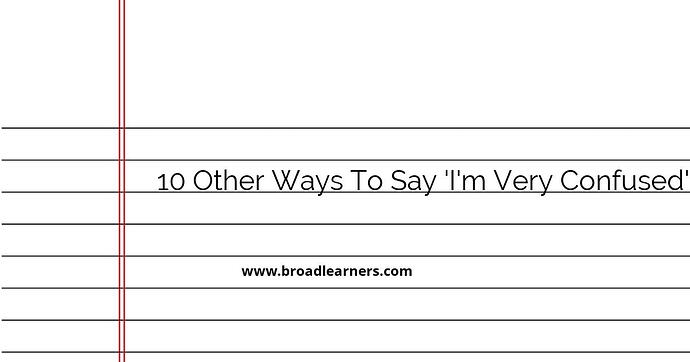Feeling confused is a common experience, but sometimes saying "I'm very confused" can sound repetitive. If you're looking for other ways to express your confusion, here are 10 alternatives:
- I'm completely baffled
- I'm utterly bewildered
- I'm thoroughly perplexed
- I'm totally at a loss
- I'm really puzzled
- I'm deeply mystified
- I'm extremely disoriented
- I'm utterly flummoxed
- I'm incredibly befuddled
- I'm downright confounded
Now let's explore each alternative in more detail:
1. I'm completely baffled
Saying "I'm completely baffled" means that you are completely unable to understand or make sense of something. It implies a high level of confusion and perplexity.
Example: "After reading the instructions multiple times, I'm completely baffled. I have no idea how to assemble this puzzle."
2. I'm utterly bewildered
When you say "I'm utterly bewildered," you are expressing a profound state of confusion and bewilderment. It indicates that you are completely lost and unable to comprehend a situation.
Example: "The sudden change in plans has left me utterly bewildered. I don't know what to do or how to proceed."
3. I'm thoroughly perplexed
If you're thoroughly perplexed, you are completely puzzled and unable to find a solution or understanding. It suggests a deep sense of confusion and uncertainty.
Example: "The complex mathematical problem has left me thoroughly perplexed. I've tried different approaches, but none of them seem to work."
4. I'm totally at a loss
When you say "I'm totally at a loss," you are admitting that you have no idea or understanding of a particular situation. It conveys a sense of helplessness and confusion.
Example: "I'm totally at a loss when it comes to using this new software. I've tried watching tutorials, but I still can't figure it out."
5. I'm really puzzled
Saying "I'm really puzzled" means that you are genuinely confused and unable to comprehend a situation or problem. It conveys a sense of curiosity and a desire for clarification.
Example: "The contradictory statements made by the witness have left me really puzzled. I can't make sense of their testimony."
6. I'm deeply mystified
When you say "I'm deeply mystified," you are expressing a strong sense of confusion and a lack of understanding. It suggests that something is beyond your comprehension.
Example: "The disappearance of the artifact has left experts deeply mystified. They can't explain how it vanished without a trace."
7. I'm extremely disoriented
If you're extremely disoriented, you are feeling confused and lost in your surroundings. It implies a sense of being out of place and not knowing which way to go.
Example: "After the long flight and the time zone difference, I'm extremely disoriented. I don't know where I am or what time it is."
8. I'm utterly flummoxed
When you say "I'm utterly flummoxed," you are expressing a state of complete confusion and perplexity. It suggests that you are completely stumped and unable to find a solution.
Example: "The riddle presented to us has left me utterly flummoxed. I can't figure out the answer, no matter how hard I try."
9. I'm incredibly befuddled
Saying "I'm incredibly befuddled" means that you are extremely confused and unable to understand a situation or problem. It conveys a sense of being overwhelmed by complexity.
Example: "The advanced physics concepts being discussed in class have me incredibly befuddled. I can't grasp the theories."
10. I'm downright confounded
If you're downright confounded, you are expressing a state of complete confusion and astonishment. It suggests that you are utterly perplexed and unable to make sense of something.
Example: "The sudden turn of events has left me downright confounded. I never expected such a surprising outcome."
These alternatives will help you express your confusion in a more varied and nuanced way. Choose the one that best fits your situation and use it to communicate effectively.
Did I miss anything? Respond below
